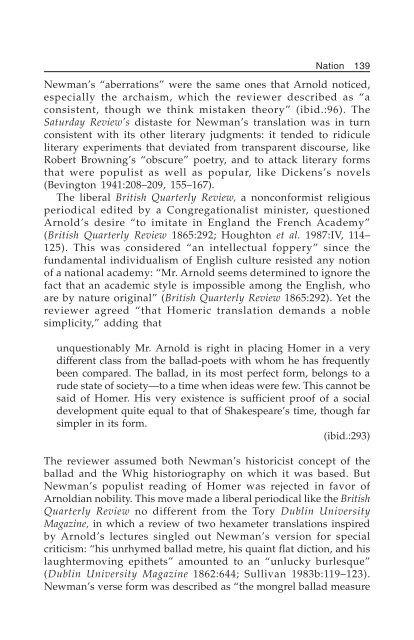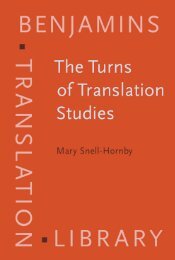- Page 2 and 3:
The Translator’s Invisibility The
- Page 4 and 5:
The Translator’s Invisibility A H
- Page 6:
Contents General editors’ preface
- Page 9 and 10:
viii General editors’ preface con
- Page 11 and 12:
x Preface and acknowledgements Maul
- Page 13 and 14:
xii Preface and acknowledgements 5
- Page 15 and 16:
2 The Translator’s Invisibility m
- Page 17 and 18:
4 The Translator’s Invisibility
- Page 19 and 20:
6 The Translator’s Invisibility
- Page 21 and 22:
8 The Translator’s Invisibility a
- Page 23 and 24:
10 The Translator’s Invisibility
- Page 25 and 26:
12 The Translator’s Invisibility
- Page 27 and 28:
14 The Translator’s Invisibility
- Page 29 and 30:
16 The Translator’s Invisibility
- Page 31 and 32:
18 The Translator’s Invisibility
- Page 33 and 34:
20 The Translator’s Invisibility
- Page 35 and 36:
22 The Translator’s Invisibility
- Page 37 and 38:
24 The Translator’s Invisibility
- Page 39 and 40:
26 The Translator’s Invisibility
- Page 41 and 42:
28 The Translator’s Invisibility
- Page 43 and 44:
30 The Translator’s Invisibility
- Page 45 and 46:
32 The Translator’s Invisibility
- Page 47 and 48:
34 The Translator’s Invisibility
- Page 49 and 50:
36 The Translator’s Invisibility
- Page 51 and 52:
38 The Translator’s Invisibility
- Page 53 and 54:
40 The Translator’s Invisibility
- Page 55 and 56:
42 The Translator’s Invisibility
- Page 57 and 58:
44 The Translator’s Invisibility
- Page 59 and 60:
46 The Translator’s Invisibility
- Page 61 and 62:
48 The Translator’s Invisibility
- Page 63 and 64:
50 The Translator’s Invisibility
- Page 65 and 66:
52 The Translator’s Invisibility
- Page 67 and 68:
54 The Translator’s Invisibility
- Page 69 and 70:
56 The Translator’s Invisibility
- Page 71 and 72:
58 The Translator’s Invisibility
- Page 73 and 74:
60 The Translator’s Invisibility
- Page 75 and 76:
62 The Translator’s Invisibility
- Page 77 and 78:
64 The Translator’s Invisibility
- Page 79 and 80:
66 The Translator’s Invisibility
- Page 81 and 82:
68 The Translator’s Invisibility
- Page 83 and 84:
70 The Translator’s Invisibility
- Page 85 and 86:
72 The Translator’s Invisibility
- Page 87 and 88:
74 The Translator’s Invisibility
- Page 89 and 90:
76 The Translator’s Invisibility
- Page 91 and 92:
78 The Translator’s Invisibility
- Page 93 and 94:
80 The Translator’s Invisibility
- Page 95 and 96:
82 The Translator’s Invisibility
- Page 97 and 98:
84 The Translator’s Invisibility
- Page 99 and 100:
86 The Translator’s Invisibility
- Page 101 and 102: 88 The Translator’s Invisibility
- Page 103 and 104: 90 The Translator’s Invisibility
- Page 105 and 106: 92 The Translator’s Invisibility
- Page 107 and 108: 94 The Translator’s Invisibility
- Page 109 and 110: 96 The Translator’s Invisibility
- Page 111 and 112: 98 The Translator’s Invisibility
- Page 113 and 114: 100 The Translator’s Invisibility
- Page 115 and 116: 102 The Translator’s Invisibility
- Page 117 and 118: 104 The Translator’s Invisibility
- Page 119 and 120: 106 The Translator’s Invisibility
- Page 121 and 122: 108 The Translator’s Invisibility
- Page 123 and 124: 110 The Translator’s Invisibility
- Page 125 and 126: 112 The Translator’s Invisibility
- Page 127 and 128: 114 The Translator’s Invisibility
- Page 129 and 130: 116 The Translator’s Invisibility
- Page 131 and 132: 118 The Translator’s Invisibility
- Page 133 and 134: 120 The Translator’s Invisibility
- Page 135 and 136: 122 The Translator’s Invisibility
- Page 137 and 138: 124 The Translator’s Invisibility
- Page 139 and 140: 126 The Translator’s Invisibility
- Page 141 and 142: 128 The Translator’s Invisibility
- Page 143 and 144: 130 The Translator’s Invisibility
- Page 145 and 146: 132 The Translator’s Invisibility
- Page 147 and 148: 134 The Translator’s Invisibility
- Page 149 and 150: 136 The Translator’s Invisibility
- Page 151: 138 The Translator’s Invisibility
- Page 155 and 156: 142 The Translator’s Invisibility
- Page 157 and 158: 144 The Translator’s Invisibility
- Page 159 and 160: 146 The Translator’s Invisibility
- Page 161 and 162: Chapter 4 Dissidence The fundamenta
- Page 163 and 164: 150 The Translator’s Invisibility
- Page 165 and 166: 152 The Translator’s Invisibility
- Page 167 and 168: 154 The Translator’s Invisibility
- Page 169 and 170: 156 The Translator’s Invisibility
- Page 171 and 172: 158 The Translator’s Invisibility
- Page 173 and 174: 160 The Translator’s Invisibility
- Page 175 and 176: 162 The Translator’s Invisibility
- Page 177 and 178: 164 The Translator’s Invisibility
- Page 179 and 180: 166 The Translator’s Invisibility
- Page 181 and 182: 168 The Translator’s Invisibility
- Page 183 and 184: 170 The Translator’s Invisibility
- Page 185 and 186: 172 The Translator’s Invisibility
- Page 187 and 188: 174 The Translator’s Invisibility
- Page 189 and 190: 176 The Translator’s Invisibility
- Page 191 and 192: 178 The Translator’s Invisibility
- Page 193 and 194: 180 The Translator’s Invisibility
- Page 195 and 196: 182 The Translator’s Invisibility
- Page 197 and 198: 184 The Translator’s Invisibility
- Page 199 and 200: 186 The Translator’s Invisibility
- Page 201 and 202: 188 The Translator’s Invisibility
- Page 203 and 204:
190 The Translator’s Invisibility
- Page 205 and 206:
192 The Translator’s Invisibility
- Page 207 and 208:
194 The Translator’s Invisibility
- Page 209 and 210:
196 The Translator’s Invisibility
- Page 211 and 212:
198 The Translator’s Invisibility
- Page 213 and 214:
200 The Translator’s Invisibility
- Page 215 and 216:
202 The Translator’s Invisibility
- Page 217 and 218:
204 The Translator’s Invisibility
- Page 219 and 220:
206 The Translator’s Invisibility
- Page 221 and 222:
208 The Translator’s Invisibility
- Page 223 and 224:
210 The Translator’s Invisibility
- Page 225 and 226:
212 The Translator’s Invisibility
- Page 227 and 228:
214 The Translator’s Invisibility
- Page 229 and 230:
216 The Translator’s Invisibility
- Page 231 and 232:
218 The Translator’s Invisibility
- Page 233 and 234:
220 The Translator’s Invisibility
- Page 235 and 236:
222 The Translator’s Invisibility
- Page 237 and 238:
224 The Translator’s Invisibility
- Page 239 and 240:
226 The Translator’s Invisibility
- Page 241 and 242:
228 The Translator’s Invisibility
- Page 243 and 244:
230 The Translator’s Invisibility
- Page 245 and 246:
232 The Translator’s Invisibility
- Page 247 and 248:
234 The Translator’s Invisibility
- Page 249 and 250:
236 The Translator’s Invisibility
- Page 251 and 252:
238 The Translator’s Invisibility
- Page 253 and 254:
240 The Translator’s Invisibility
- Page 255 and 256:
242 The Translator’s Invisibility
- Page 257 and 258:
244 The Translator’s Invisibility
- Page 259 and 260:
246 The Translator’s Invisibility
- Page 261 and 262:
248 The Translator’s Invisibility
- Page 263 and 264:
250 The Translator’s Invisibility
- Page 265 and 266:
252 The Translator’s Invisibility
- Page 267 and 268:
254 The Translator’s Invisibility
- Page 269 and 270:
256 The Translator’s Invisibility
- Page 271 and 272:
258 The Translator’s Invisibility
- Page 273 and 274:
260 The Translator’s Invisibility
- Page 275 and 276:
262 The Translator’s Invisibility
- Page 277 and 278:
264 The Translator’s Invisibility
- Page 279 and 280:
266 The Translator’s Invisibility
- Page 281 and 282:
268 The Translator’s Invisibility
- Page 283 and 284:
270 The Translator’s Invisibility
- Page 285 and 286:
272 The Translator’s Invisibility
- Page 287 and 288:
274 The Translator’s Invisibility
- Page 289 and 290:
276 The Translator’s Invisibility
- Page 291 and 292:
278 The Translator’s Invisibility
- Page 293 and 294:
280 The Translator’s Invisibility
- Page 295 and 296:
282 The Translator’s Invisibility
- Page 297 and 298:
284 The Translator’s Invisibility
- Page 299 and 300:
286 The Translator’s Invisibility
- Page 301 and 302:
288 The Translator’s Invisibility
- Page 303 and 304:
290 The Translator’s Invisibility
- Page 305 and 306:
292 The Translator’s Invisibility
- Page 307 and 308:
294 The Translator’s Invisibility
- Page 309 and 310:
296 The Translator’s Invisibility
- Page 311 and 312:
298 The Translator’s Invisibility
- Page 313 and 314:
300 The Translator’s Invisibility
- Page 315 and 316:
302 The Translator’s Invisibility
- Page 317 and 318:
304 The Translator’s Invisibility
- Page 319 and 320:
306 The Translator’s Invisibility
- Page 321 and 322:
308 The Translator’s Invisibility
- Page 323 and 324:
310 The Translator’s Invisibility
- Page 325 and 326:
312 The Translator’s Invisibility
- Page 327 and 328:
Notes 1 Invisibility 1 These cultur
- Page 329 and 330:
316 Notes not so much “the immedi
- Page 331 and 332:
318 Notes 2 Sheehan 1989:157-158 de
- Page 333 and 334:
320 Notes 4 Dissidence 1 My concept
- Page 335 and 336:
322 Notes Cavalcanti and Daniel ver
- Page 337 and 338:
Bibliography Abrams, M.H. (1953) Th
- Page 339 and 340:
326 Bibliography —(1962) “The I
- Page 341 and 342:
328 Bibliography —(1969) Cronopio
- Page 343 and 344:
330 Bibliography Feldman, R. and Sw
- Page 345 and 346:
332 Bibliography Hager, A. “Briti
- Page 347 and 348:
334 Bibliography Latham, W. (trans.
- Page 349 and 350:
336 Bibliography —(1984b) Otherwi
- Page 351 and 352:
338 Bibliography Parsons, A.E. (192
- Page 353 and 354:
340 Bibliography Ross, A. (1989) No
- Page 355 and 356:
342 Bibliography —(1983b) British
- Page 357 and 358:
344 Bibliography Zanzotto, A. (1975
- Page 359 and 360:
346 Index Kennerbuch” 228-30; “
- Page 361 and 362:
348 Index Everyman’s Library 140
- Page 363 and 364:
350 Index Meleagros 209 Mellor, A.
- Page 365 and 366:
352 Index Scheler, M. 303 Schelling



